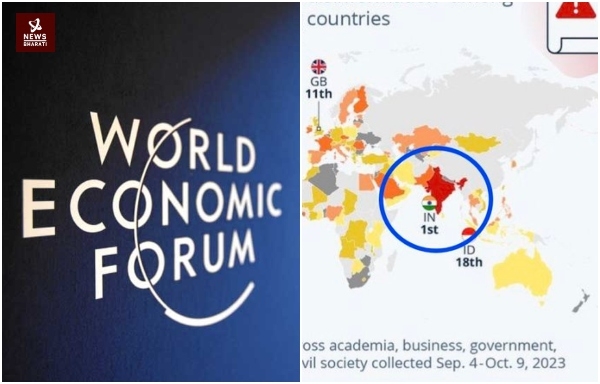WEF Report ranks India as No.1 country in misinformation, graphic shows incorrect map
Total Views |
The World Economic Forum's (WEF) 2024 Global Risks Report has stirred controversy after it ranked India as the No.1 country most susceptible to misinformation and disinformation. This report comes ahead of the elections that will be held this year globally including in India.

What is in the WEF Report?
The WEF report highlights the growing threat of misinformation and disinformation in elections across the world. These terms refer to the intentional spread of false information and the dissemination of misleading content, respectively. In the context of India, these risks have been deemed more significant than 34 other challenges such as cyber security, pollution, unemployment, terrorist attacks, infectious diseases, illicit economic activity, wealth inequality, and labour shortages among others.
The WEF 2024 Global Risks Report stated, "Emerging as the most severe global risk anticipated over the next two years, foreign and domestic actors alike will leverage Misinformation and disinformation to further widen societal and political divides."
"As close to three billion people are expected to head to the electoral polls across several economies – including Bangladesh, India, Indonesia, Mexico, Pakistan, the United Kingdom and the United States – over the next two years, the widespread use of misinformation and disinformation, and tools to disseminate it, may undermine the legitimacy of newly elected governments," the report highlighted.
Now WEF (World Economic Forum) labels India as No.1 country in misinformation (with wrong Indian Map) pic.twitter.com/xNFHyF8GCt
— Megh Updates 🚨™ (@MeghUpdates) January 24, 2024
It further added, "The presence of misinformation and disinformation in these electoral processes could seriously destabilize the real and perceived legitimacy of newly elected governments, risking political unrest, violence and terrorism, and a longer-term erosion of democratic processes."
As per the report, recent technological advancements have ushered in a new era of information manipulation, where the volume, reach, and effectiveness of falsified information have seen unprecedented growth. The expansion of disinformation campaigns across various platforms, particularly on social media, has made tracking, attributing, and controlling these flows increasingly challenging.
As India, a country with over 1.4 billion people, gears up for the Lok Sabha 2024 that is expected to be held between April and May, the WEF report noted that potential ramifications of manipulative disinformation campaigns are profound, posing significant threats to democratic processes. "If the legitimacy of elections is questioned, civil confrontation is possible – and could even expand to internal conflicts and terrorism, and state collapse in more extreme cases," it said.
WEF Report Receives Backlash
As the WEF placed India at the top of the list for misinformation and disinformation risk, many Indian netizens have criticised the development. Many citizens are expressing concerns about the methodology employed and the accuracy.
We know what WEF does stand for.. It is a mother of disinformation and misguidance.. Misleading the world by a few groups of unelected wealthy.. https://t.co/PUyBR0lpdj
— Sudipto Sen (@sendipto) January 24, 2024
Goebbelsians (WEF "experts") have identified their next #1 target, India. Consistent with the US security state posturing, the #1 purveyors of falsehood and misinformation worldwide. pic.twitter.com/aTAKbZugS8
— Shivani Sahay (@Savitri4Ever) January 23, 2024
WEF is misinformed
— Anshuman Singh (@indiancrusher) January 24, 2024
Finally pakistani youtubers will get some revenue from pakistani viewership with this content.
— Yoda (@YodaInd) January 24, 2024
Fuelling the controversy, a viral graphic titled 'Where False Information is Posing the Biggest Threat', it depicted an incorrect map of India.
Foreign agencies have always shown the wrong map of India 🇮🇳
— 卐 Āryāvarta 卐 (@Indo__Aryan) January 24, 2024
As usual India Map is incorrectly shown.
— மதுரைக்காரன்🇮🇳 (@Maduraikkaran1) January 24, 2024

